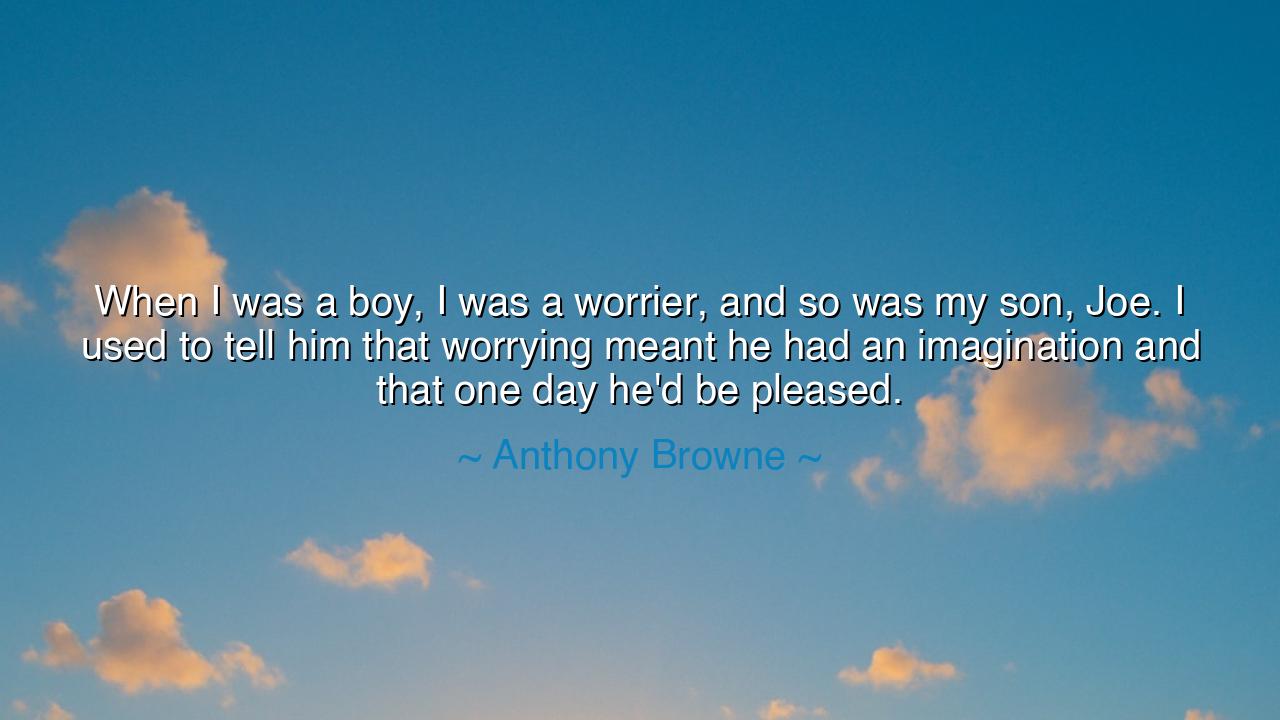
When I was a boy, I was a worrier, and so was my son, Joe. I used
When I was a boy, I was a worrier, and so was my son, Joe. I used to tell him that worrying meant he had an imagination and that one day he'd be pleased.






“When I was a boy, I was a worrier, and so was my son, Joe. I used to tell him that worrying meant he had an imagination and that one day he’d be pleased,” wrote Anthony Browne, the celebrated storyteller and illustrator of childhood wonder. Beneath this simple confession lies a wisdom as gentle as a father’s voice and as enduring as the lessons of age. Browne speaks of worry, that shadow which often haunts the minds of sensitive souls — yet he transforms it, seeing within it not weakness, but the stirring of imagination, the creative force that both trembles and dreams. His words remind us that even our fears can be the soil of future beauty.
In the innocence of youth, the mind is both tender and vast. The child who worries does so because he can imagine — he sees possibilities not only of joy, but of loss, not only of safety, but of danger. He stands at the threshold of the unseen, sensing all that might happen. To adults, this may seem a burden, but to the wise, it is the beginning of vision. For imagination and worry are twins born of the same fire: one paints the shadows of fear, the other the colors of creation. Browne’s insight is that what troubles the young heart today may become its strength tomorrow, if guided by compassion and faith.
Throughout history, the greatest minds have been worriers — not because they lacked courage, but because they could see further than others. Consider Charles Darwin, who spent much of his life in quiet torment, doubting his own ideas, fearing their consequence, questioning every conclusion. Yet from that very anxiety, his imagination took shape; his careful wonder birthed the theory that reshaped our understanding of life. Had he been blind to possibility — both glorious and grim — he might never have sought the truth so deeply. His worry was not a flaw, but a vigilant imagination watching over the world’s mysteries.
Anthony Browne, as a creator of stories and images for children, understood this intimately. His books — filled with curious animals, surreal scenes, and quiet melancholy — reflect the inner life of those who both fear and hope at once. To tell his son that his worry was a sign of imagination was to bless what others might have scolded. It was to teach him that sensitivity is a form of strength, that to feel deeply is to see deeply. Such teaching, like an ancient parable, passes down the art of transforming anxiety into creativity — fear into form, doubt into discovery.
And so we learn that worry, when met with understanding, becomes a teacher. It tells us where our hearts are tender, where our dreams still tremble. It is the imagination’s shadow, asking to be turned toward light. The ancients said that the same fire that burns also illuminates; it depends on how one tends it. To worry is human, but to use that worry as fuel for creation, as Browne suggests, is divine. The worrier imagines what could go wrong — but the artist, the thinker, the visionary — takes that same imagination and asks instead, “What could go right?”
The lesson, then, is this: do not despise your worry. Instead, learn to listen to it, to understand the dream beneath the dread. When your mind races with “what if,” pause and ask, “what can I make of this?” Channel that restless imagination into writing, painting, learning, or loving more deeply. Parents, too, must learn from Browne’s wisdom — to tell their children not that their worries are foolish, but that they are signs of a rich and thoughtful heart.
For in time, as Browne promised his son, the worrier will indeed be pleased — for he will find that his imagination, once burdened by fear, has become the source of his vision, empathy, and art. The one who worried about the world will grow to shape it, to mend its fractures, to imagine its healing. Thus, the anxious child becomes the compassionate creator, and what once seemed weakness reveals itself as the first trembling of genius.






AAdministratorAdministrator
Welcome, honored guests. Please leave a comment, we will respond soon